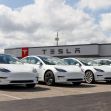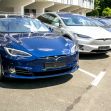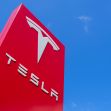Tesla is taking on the state of Louisiana in its latest lawsuit which argues that the electric automaker’s right to sell directly to customers is limited under Louisiana laws.
The lawsuit was filed in late August in the U.S. District Court for the Eastern District of Louisiana. At the heart of the lawsuit, Tesla argues that the state law is violating interstate commerce laws that allow Tesla to sell directly to consumers.
Unlike long-standing automakers including Honda, Ford, Toyota, and many others, Tesla operates on a direct-to-customer sales model.
These longstanding automakers manufacture their vehicles and then pass them off to independently owned franchise facilities, aka your Local Honda, Ford, or Toyota dealership. It's from these dealerships that consumers can come and purchase new vehicles.
Because these dealerships operate independently of the automaker, dealerships will typically hike up the price by about 10 to 12% in order to turn a profit. For many customers, this means dealing with negotiations and dealership tactics to secure a price closer to the manufacturer's recommended MSRP.
Because Tesla does not utilize franchises, instead selling their vehicles directly to consumers online, the automaker insists that these franchise laws which were born out of the need to regulate the auto industry and keep the playing field level are draconian in today's automotive climate.
Over the years, Tesla has fought and won in roughly half the nation's states to be able to sell directly to consumers online. Louisiana, along with 17 other states, still has laws on the books that prohibit direct auto sales to customers.
Tesla has been creative, however. In states where it hasn’t been able to win or bring forward a legal battle, the automaker has found other ways to bring customers into contact with Tesla's automobiles.
Throughout the nation, Tesla has set up pop-up galleries. These galleries display the latest Tesla models available and allow consumers to try them out for themselves. However, unlike the dealership, Tesla does not sell vehicles to consumers in the gallery and instead avoids any discussion about price at all.
If a consumer is interested in purchasing a Tesla, company reps at the gallery direct consumers to Tesla’s online database allowing them to explore the Tesla models they are interested in further. When a customer makes a purchase, the vehicle is then shipped into the state and delivered to the customer's home.
Tesla's ingenious loophole involves interstate commerce law by inviting customers into the gallery and then selling them a vehicle online that is then shipped to them across state lines into the state in which they live has long been the practice employed by Tesla in order to continue its direct sales to customers.
The company outlines that Louisiana's law which bans Tesla from selling directly to consumers is a direct violation of the interstate commerce law, the tactic Tesla has been using to avoid violating state laws that prohibit direct-to-customer sales.
If successful in its lawsuit, Tesla could help prompt another win in similar states including Texas, where the company is building its highly anticipated gigafactory.
Like a handful of other states, Texas still bans automotive sales directly from the manufacturer to the consumer. If the Texas law stands, it would require Tesla to ship models manufactured in the Texas gigafactory outside of the state only to ship them back into the state in order to utilize the interstate commerce loophole — a move that would be incredibly inefficient to both Tesla and other automotive car companies that plan to deal directly with consumers.
If the lawsuit proves successful, it will completely disrupt the decades-old statutes that have banned manufacturers from selling directly to consumers. During a time when innovation, especially in the digital space, is constantly growing, Tesla has shown it will go to any legal length to prove that laws need to adapt to the changing market in order to keep up with that innovation.






